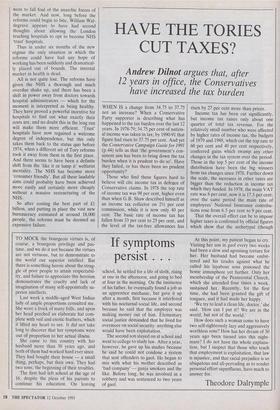If symptoms persist . . .
TO MOCK the bourgeois virtues is, of course, a bourgeois privilege and pas- time, and we do it not because the virtues are not virtuous, but to demonstrate to the world our superior intellect. But there is something heroic about the strug- gle of poor people to attain respectabil- ity, and failure to appreciate this heroism demonstrates the cruelty and lack of imagination of many self-appointedly su- perior intellects.
Last week a middle-aged West Indian lady of ample proportions consulted me. She wore a frock of many frills, and upon her head perched an elaborate hat com- plete with veil and exotic feathers, which it lifted my heart to see. It did not take long to discover that her symptoms were out of proportion to her actual illness.
She came to this country with her husband more than 30 years ago, and both of them had worked hard ever since. They had bought their house — a small thing, perhaps, but their own. They had two sons, the beginning of their troubles.
The first had left school at the age of 16, despite the pleas of his parents to continue his education. On leaving school, he settled for a life of sloth, rising at one in the afternoon, and going to bed at four in the morning. On the insistence of his father, he eventually found a job as an apprentice mechanic, but gave it up after a month, first because it interfered with his nocturnal social life, and second because he said that the employer was making money out of him. Elementary social justice demanded that he lived for evermore on social security: anything else would have been exploitation.
The second son stayed on at school and went to college to study law. After a year, however, he gave up his studies because he said he could not condone a system that sent offenders to gaol. He began to mix with what his mother described as tad company' — ganja smokers and the like. Before long, he was involved in a robbery and was sentenced to two years of gaol. At this point, my patient began to cry. Visiting her son in gaol every two weeks had been a slow and agonising torture for her. Her husband had become embit- tered and his tirades against what he called his layabout sons poisoned the home atmosphere yet further. Only her membership of the Pentecostal Church, which she attended four times a week, sustained her. Recently, for the first time, she had been granted the gift of tongues, and it had made her happy.
`We try to lead a clean life, doctor,' she said. `How can I put it? We are in the world, but not of the world.'
How does such a woman come to have two self-righteously lazy and aggressively worthless sons? How has her dream of 30 years ago been turned into this night- mare? I do not have the whole explana- tion, but I suspect that those who teach that employment is exploitation, that law is injustice, and that racial prejudice is so ubiquitous and all-pervading as to render personal effort superfluous, have much to answer for.
Theodore Dalrymple


























































 Previous page
Previous page